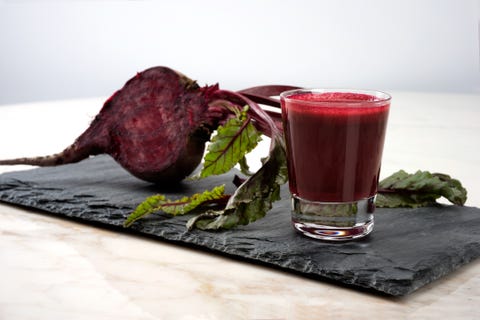
- Many health food stores sell nitric oxide supplements, which claim to boost workout performance and enhance endurance
- Nitric oxide is a naturally occurring gas in the body that helps increase blood flow
- Nitric oxide supplements contain ingredients that are said to produce more nitric oxide in the body, thereby improving your workout
- But do they actually work? The research is mixed
If you spend a lot of time in supplement stores, you’ve probably come across nitric oxide (NO) supplements. And after reading about the amazing benefits they may have for your workout, you may have even been tempted to try them.
For the uninitiated, nitric oxide is a gas produced naturally by the body that helps increase blood flow. NO supplements are said to increase the amount of nitric oxide in your body, which theoretically could lead to enhanced muscle pump, better endurance, and faster recovery. (To be clear, nitric oxide is very different from nitrous oxide, a.k.a. the stuff that gets you high in whip-its.)
In theory, NO supplements could do wonders for your fitness routine. But if these eye-catching claims sound too good to be true, well, you might be right.
WHAT DO NITRIC OXIDE SUPPLEMENTS DO?
Nitric oxide is a gas that’s made by your body, and one of its primary purposes is to promote vasodilation, or increased blood flow.
In the body, “nitric oxide is secreted by the endothelial cells, which line the inner walls of the blood vessels, and it communicates with the smooth muscle cells, triggering them to relax,” explains Nathan Jenkins, Ph.D., an assistant professor in the Department of Kinesiology at the University of Georgia. This blood flow regulation plays a role in multiple body functions, including maintaining erections, controlling blood pressure, and more.
NO supplements, however, don’t actually contain nitric oxide — instead, they contain ingredients (or substrates) that are thought to give your body a nudge to produce more nitric oxide, such as L-arginine and L-citrulline.
“If you’re ingesting nitrate or L-arginine, the idea is that it’s supposed to stimulate the synthesis of nitric oxide in the endothelial cell. So the the more substrates there are, the more NO can be produced,” explains Jenkins.
Because blood is responsible for carrying oxygen to working muscles, the reasoning is that the increased blood flow caused by taking NO supplements might help you work out for a longer period of time and speed up recovery time. Proponents also claim that increased blood flow might increase the “pump’” of your muscles, or how large or pronounced they look (because they’re literally engorged with blood).
OK, BUT DO NITRIC OXIDE SUPPLEMENTS ACTUALLY WORK?
Honestly, we don’t really know. There’s simply not enough evidence to suggest that they do.
“[The idea is that these supplements] will increase NO, and then because of that, it’ll cause vasodilation, and then the downstream effect of vasodilation would be this massive increase in blood flow, which leads to increased exercise performance and enhanced recovery,” says Richard Bloomer, Ph.D., dean of the School of Health Studies and The Center for Wellness and Fitness at the University of Memphis. “But most, if not all, of [these purported benefits] have not been supported by available evidence.”
While it is known that L-arginine, L-citrulline, and nitrate play a role in NO synthesis in the body, it’s not known whether taking them in supplement form can also have an impact on NO synthesis. But even if they did increase NO synthesis, it’s unclear whether this would actually make a noticeable difference in exercise performance or recovery.
In studies that have shown a link between improvements in performance and nitrate levels in the blood, such positive results could simply be a result of extensive training, as exercise itself enhances NO activity. Plus, dietary nitrate comes from other sources, like vegetables, and most studies don’t control for this.
Even if there are benefits to NO supplementation, it’s unclear whether they would apply to everyone. A review of 42 studies related to the effects of dietary ingredients linked with NO and exercise performance found mixed results: the review concluded that while NO supplements may “improve tolerance” to aerobic and anaerobic exercise in people who either aren’t in shape or are moderately trained, there seems to be no benefit in highly trained people.
I READ THAT BEETROOT JUICE CAN IMPROVE YOUR WORKOUT. IS THERE ANY TRUTH TO THAT?
Actually, maybe. A few studies have shown that nitrate supplementation through beetroot juice can be effective at increasing endurance and overall power. One studyfound a link between 15 days of beetroot juice supplementation and an increase in power max during moderate–intensity cycling tests. While more research is required, both Bloomer and Jenkins note that of the ingredients that may have an impact on NO levels and exercise performance, beetroot juice is the most promising.
DO NITRIC OXIDE SUPPLEMENTS HAVE ANY SIDE EFFECTS?
Even though the jury’s out on whether NO supplements really do improve performance, Bloomer says if you want to try them at a low dosage, go ahead. That said, if you’re prone to hypotension (or low blood pressure), you might want to skip them, as they could leave you feeling lightheaded or dizzy.
Jenkins also notes that high dosages of NO supplements could put your kidney function at risk, particularly if you already have a nitrate-heavy diet. In such cases, “it might actually cause a reduction in performance, because your kidneys are stressed out and trying to process all this extra nitrate,” says Jenkins. To be on the safe side, don’t take anything more than what’s instructed on the package.
It’s also worth noting that the supplement industry is notorious for its lack of regulation— so if you do really, really want to take them, don’t exceed the suggested dosage, and keep an eye out for any other adverse effects.
[“Source-menshealth”]




















